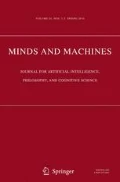Abstract
This article argues that: (i) Defeasible reasoning is the use of distinctive procedures for belief revision when new evidence or new authoritative judgment is interpolated into a system of beliefs about an application domain. (ii) These procedures can be explicated and implemented using standard higher-order logic combined with epistemic assumptions about the system of beliefs. The procedures mentioned in (i) depend on the explication in (ii), which is largely described in terms of a Prolog program, EVID, which implements a system for interactive, defeasible reasoning when combined with an application knowledge base. It is shown that defeasible reasoning depends on a meta-level Closed World Assumption applied to the relationship between supporting evidence and a defeasible conclusion based on this evidence. Thesis (i) is then further defended by showing that the EVID explication of defeasible reasoning has sufficient representational power to cover a wide variety of practical applications of defeasible reasoning, especially in the context of decision making.
Similar content being viewed by others
References
Belzer, M. and B., Loewer (1988), ‘A Conditional Logic for Defeasible Beliefs’, Decision Support Systems 4 (1), pp. 129–142.
Causey, R. L. (1990), EVID: A System for Interactive Defeasible Reasoning (University of Texas A.I. Laboratory Technical Report No. AI90-119 36 pp.), University of Texas Artificial Intelligence Laboratory, Austin, TX.
Causey, R. L. (In Press), ‘EVID: A System for Interactive Defeasible Reasoning’, Decision Support Systems. (Expanded version of the preceding.)
Chisholm, R. M. (1964), ‘The Ethics of Requirement’, American Philosophical Quarterly 1 (2), pp. 147–153.
Ginsberg, M. L. (ed.) (1987), Readings in Nonmonotonic Reasoning, San Mateo, CA: Morgan Kaufmann. (Contains reprints of many recent articles on the subject.)
Israel, D. J. (1980), ‘What's Wrong with Non-Monotonic Logic?’, in Proceedings of the First Annual National Conference on Artificial Intelligence, pp. 99–101, San Mateo, CA: Morgan Kaufmann. (Reprinted in M. L. Ginsberg, Readings in Nonmonotonic Reasoning, above, pp. 53–55.)
Kimbrough, S. O. and F., Adams (1988), “Why Nonmonotonic Logic?’, Decision Support Systems 4 (1), pp. 111–127.
Kimbrough, S. O. and R. M. Lee (eds.) (1988), Decision Support Systems 4 (1).
McCarthy, J. (1986), ‘Applications of Circumscription to Formalizing Common-Sense Knowledge’, Artificial Intelligence 28 (1), pp. 89–116. (Reprinted in the Ginsberg anthology above, pp. 153–166.)
Nute, D. (1988), ‘Defeasible Reasoning and Decision Support Systems,’ Decision Support Systems 4 (1), pp. 97–110.
Pappas, G. S. and M. Swain (eds.) (1978), Essays on Knowledge and Justification, Ithaca, NY: Cornell University Press.
Petrie, C. J., R. L., Causey, D. D., Steiner, and V., Dhar (1989), A Planning Problem: Revisable Academic Course Scheduling (MCC Technical Report No. ACT-AI-020-89, 98 pp.) Microelectronics and Computer Technology Corp., 3500 West Balcones Center Dr., Austin, TX 78759.
Pollock, J. L. (1987a), Contemporary Theories of Knowledge, Totowa, New Jersey: Roman & Littlefield.
Pollock, J. L. (1987b), ‘Defeasible Reasoning’, Cognitive Science 11 (4), pp. 481–518.
Sergot, M. J., F., Sadri, R. A., Kowalski, F., Kriwaczek, P., Hammond, and H. T.Cory (1986), ‘The British Nationality Act as a Logic Program’, Communications of the Association for Computing Machinery 29 (5), pp. 370–386.
Wittgenstein, L. (1922), Tractatus Logico-Philosophicus, London: Routledge & Kegan Paul.
Author information
Authors and Affiliations
Rights and permissions
About this article
Cite this article
Causey, R.L. The epistemic basis of defeasible reasoning. Minds and Machines 1, 437–458 (1991). https://doi.org/10.1007/BF00352919
Issue Date:
DOI: https://doi.org/10.1007/BF00352919


